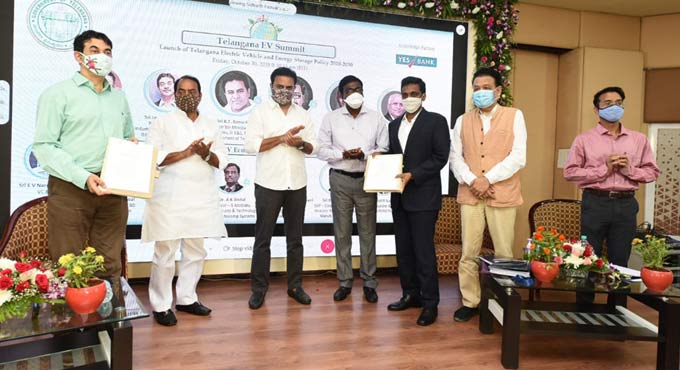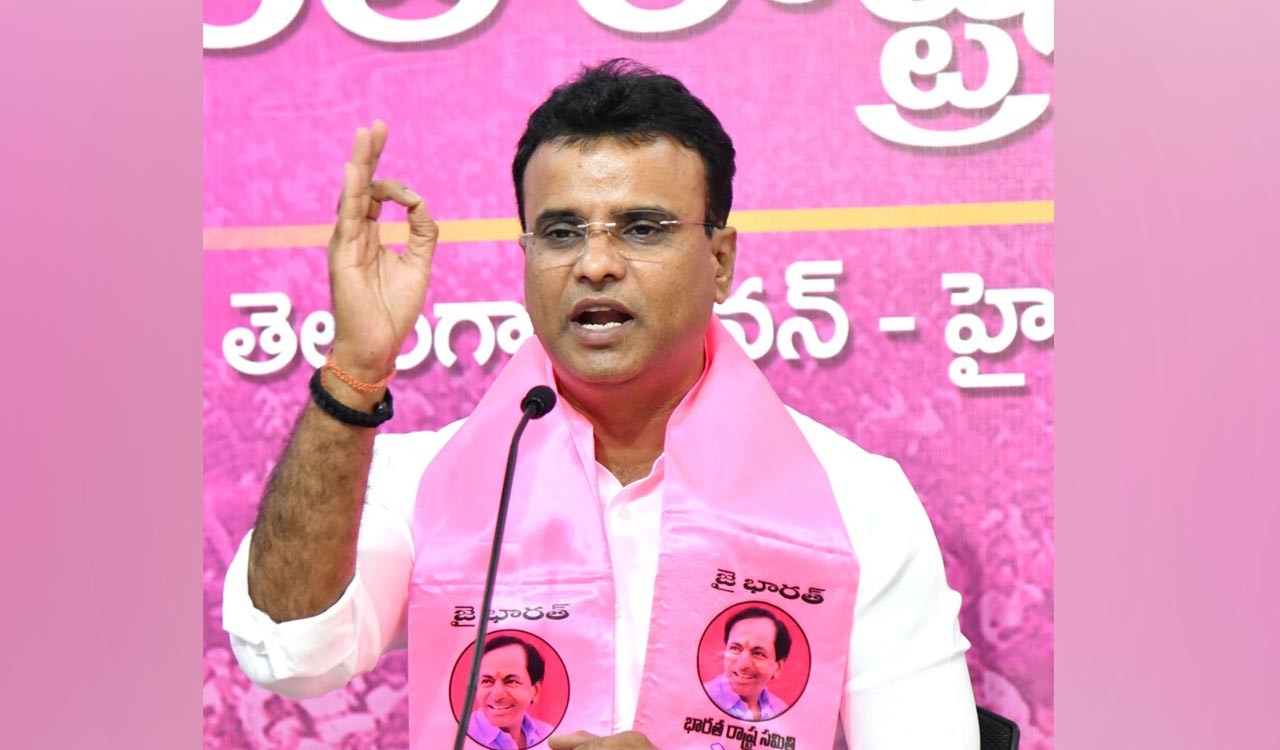Telangana unveils Electric Vehicle and Energy Storage policy
The policy offers 100 per cent exemption of road tax and registration fee for the first two lakh electric two-wheelers purchased and registered within the State.

Hyderabad: Telangana State took a giant stride to emerge as the leader in sustainable mobility and energy storage space in the country on Friday when it rolled out the much-awaited comprehensive Electric Vehicle and Energy Storage (EV&ESS) Policy.
The State government’s target, through immediate implementation of the policy, is to attract a massive $4 billion worth of investments that would also lead to creation of 1.2 lakh jobs by 2030.
Launching the policy here, IT and Industries Minister KT Rama Rao said Telangana State already boasts of having the largest electronics cluster with over 1,000 acres available in e-city in Raviryal and another park at Maheshwaram for electronics manufacturers. The State also has a huge National Investment and Manufacturing Zone (NIMZ) in Zaheerabad.
“The State would like to promote itself as an automobile cluster and will offer another 1,000 acres for companies that are looking to set up manufacturing base, to create a comprehensive ecosystem for EVs in the State,” he said. Two more clusters will be announced soon, one at Chandanvelli, Shahbad of RR District as an EV cluster and another at Divitipalli in Mahabubnagar for a new EV cluster, he said, adding that plans are also afoot for a mobility cluster next month where technology and mobility companies will set up their base.
“We invite the industry to come and make Telangana their manufacturing base as we believe local production is the key to achieve price/performance parity and enable faster adoption of electric vehicles,” the Minister said. All these clusters will eventually provide a comprehensive ground for anyone who is looking to set up electric vehicle manufacturing base in Telangana, when they look at India for investment. Industrial policies such as the TS-iPASS will continue to attract investments into the State to push both manufacturing and research.
The presence of PSU electronics companies such as ECIL and BEL will continue to add strength to the ecosystem, besides the large presence of MSMEs further propelling the State to emerge as the leader in EV space, Rama Rao said.
Stating that there had to be collaborative efforts by all the stakeholders including governments, private sector, startups, original equipment manufacturers (OEMs), aggregators for the policy to succeed, he said all the departments concerned will also have to work closely and work with a goal to ensure environmental protection.
He appealed to the automobile manufacturers/OEMs and other stakeholders to make Hyderabad the test bed for implementation of electric vehicle pilots as the government wants to make great strides in green mobility adoption and as well as become the manufacturing hub for electric vehicles.
“Come and work with our Hyderabad Metro Rail, MMTS and RTC to explore better public transport solution, and shared mobility solutions with aggregators, so that more people can be taken away from polluting vehicles that are impacting our cities today,” he added.
Highlighting the strides made on the sustainability front, he said, Telangana has seen success in sustainable energy, with the State taking the installed solar capacity to 4,100 MW (reaching second spot in India) now from 45 MW when the State was formed, which reflects the commitment of Telangana Chief Minister KCR toward renewable energy.
KTR said that the manufacturing ecosystem has been thriving in the State with several players such as Mahindra & Mahindra investing significantly and generating employment. The company is making tractors at Zaheeerabad, and now the company plans to develop an electric tractor in collaboration with Japanese partners. Farmers will enormously benefit with such technology advancements.
There will be several collaborations in future for battery manufacturing and charging stations across public transport hubs, with the roll out of this policy framework. To boost public transport, Telangana is establishing 178 stations for e-buses. The State has also received several proposals with intent to create more charging infrastructure. The government will further enhance the incentives offered in the policy if the need arises, KTR assured.
Cluster development
Strong economy
While Indian economy has been struggling since pre-Covid times, the State has seen a healthy economic growth year-on-year with its annual GSDP growth rate at 14.2 per cent.
The State has been consistently ranked among the top three States in terms of ease of doing business (EoDB). Though the ranking has slipped this year, the State will bounce back with its TS-iPASS single window clearance system, which has been instrumental in attracting over $28 billion investments in the last five years, added KTR.
Diversified portfolio
Telangana continues to hold the second spot in IT exports, with a growth rate well above the national average. Several automotive multinationals have set up base in the State such as ZF, while several electronics companies such as Oppo, Intel and Micron have set up base here.
The State will leverage its strength in electronics, aerospace and defence and IT sectors thereby developing synergies to create centres for research and innovation for emerging technologies including autonomous and connected vehicles.
Now you can get handpicked stories from Telangana Today on Telegram everyday. Click the link to subscribe.
Click to follow Telangana Today Facebook page and Twitter .
Related News
-
Disqualification of BRS turncoat MLAs inevitable, elections soon, says KP Vivekanand
-
Hyderabad: EAGLE Force arrests man with 28 kg ganja at Abdullapurmet
-
BRS Impact: TSHRC orders immediate restoration of water, power, for Dalits in Hanamkonda
-
TSWREIS alumni shine as India wins gold at Indo-Indonesia Ball Badminton Series
-
Odisha government reviews protection of Lord Jagannath temple lands
4 hours ago -
Iran holds military drills with Russia as US carrier moves closer
5 hours ago -
This is taxpayers’ money: Supreme Court raps freebies culture
5 hours ago -
Hyderabad: Residents oppose Gandhi Sarovar Project over ‘forcible’ land acquisition
5 hours ago -
Australia level series as Indian women slide to 19-run defeat in second T20I
6 hours ago -
Karnataka beat Uttarakhand in semis, to face Jammu and Kashmir in Ranji final
6 hours ago -
Five Osmania varsity players in South Zone squad for Vizzy Trophy
6 hours ago -
Disciplined West Indies bundle out Italy with ease, tops Group C in T20 WC
6 hours ago




